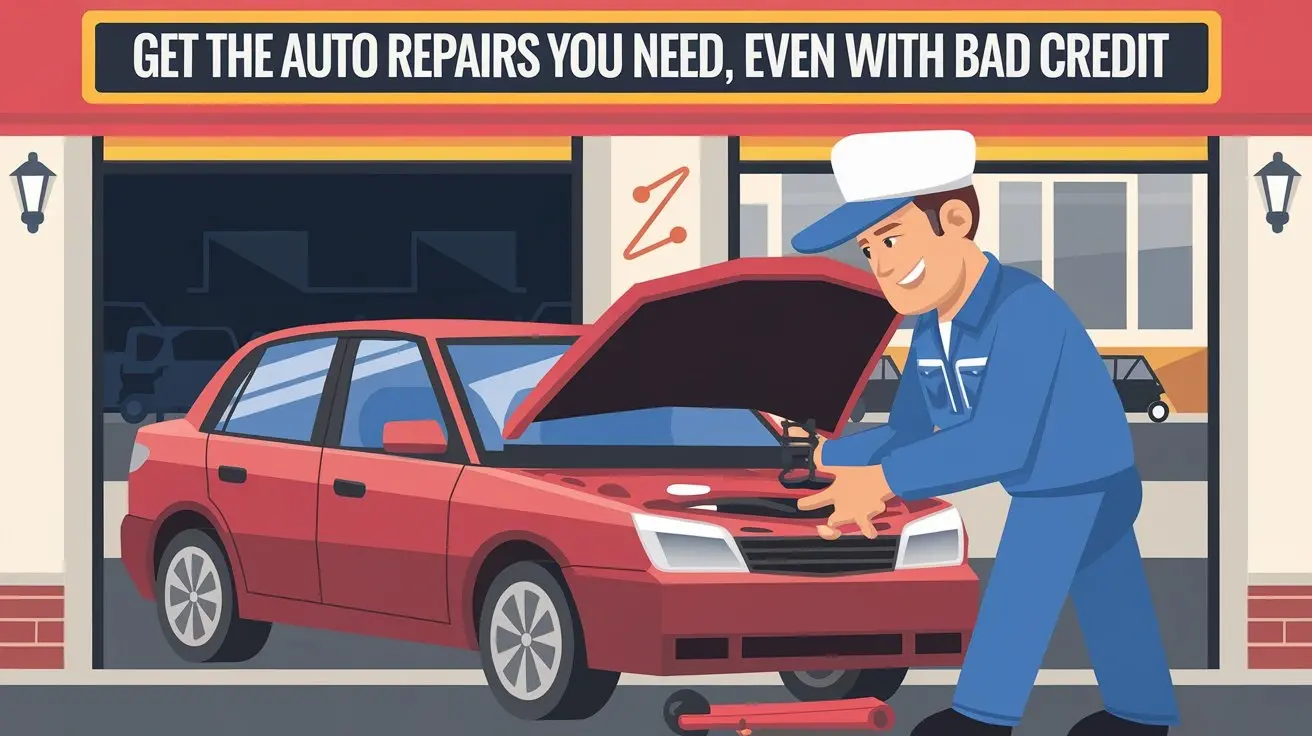-
Posted on: 09 Dec 2024

-
A good credit score is very important in today's world of finance. It helps you get loans, enjoy better interest rates, and have an easier financial path. If your credit report shows issues because of mistakes or past problems, credit repair can help you improve. Before starting this process, it is important to know what it truly costs to repair your credit. This cost is not just about money. You also need to consider the time, effort, and possible risks involved.
Understanding Credit Repair: An Overview
Credit repair is about making your credit score better by fixing negative stuff on your credit report. This process looks at problems like late payments, spelling mistakes that can cause identity issues or old debt information. The goal of credit repair is to correct these mistakes so that your credit shows a true picture of your ability to pay back loans.
Credit repair does not mean removing real negative marks. If your credit report shows late payments or defaults and they are correct, they will stay there until the statute of limitations runs out. Credit repair only aims to fix errors, making sure that the report gives a fair look at your credit history.
The Basics of Credit Repair
The first step in credit repair is to get a free credit report from the three major credit bureaus: Equifax, Experian, and TransUnion. These reports show your credit history, including open accounts, payment history, and any negative marks. Checking these reports closely is very important. You need to find any errors or inaccuracies that may lower your credit score.
After you have your credit reports, look closely at each part for mistakes. Check for accounts you don’t recognize, wrong balances, or payments that are marked as late when you paid them on time. If you find anything incorrect, you should dispute it with the credit bureau.
To dispute errors, contact the credit bureau and send in proof to support your claim. This might be bank statements showing your timely payments or papers that explain any mistakes. The credit bureau will then investigate the dispute and fix or remove any verified inaccuracies. This will help make your credit report more precise and improve your credit score.
Different Methods of Credit Repair
When you think about credit repair, you have two main options: hiring credit repair companies or doing it yourself. Credit repair companies are good at dealing with credit reports. They can help dispute any inaccurate information for you. They talk with credit bureaus, collect the papers they need, and try to remove negative items from your report. But, you will need to pay for this help.
Doing credit repair on your own puts you in charge. You will need to get your credit reports, find any mistakes, and reach out to credit bureaus and creditors to dispute what’s not correct. This way takes more time, but you can save money. It is a good choice for people who feel okay handling their credit repair by themselves.
Deciding between DIY and using professional credit repair depends on your situation, budget, and how much you are comfortable with the process. DIY can save you cash, while professionals offer their skills and can save you time and work. Think carefully about the good and bad points of both options to find what works best for you.
The Real Cost of Professional Credit Repair Services
Outsourcing credit repair to experts can seem tempting. However, it's important to know the costs involved. Credit repair companies are businesses, and they charge fees for their services. These fees can be different based on the company, how complex your credit history is, and the services they provide.
Before you sign any contracts, ask about the company’s pricing. Some companies have monthly fees, while others charge for each deletion they handle. Make sure you understand how these fees work. It’s a good idea to compare quotes from different companies to ensure you are getting a good and clear deal.
Average Costs and Pricing Structures
Credit repair costs can be as diverse as the companies offering them. Understanding the common pricing structures is key to making an informed decision. The most prevalent method is the monthly fee, where you pay a recurring charge for the duration of your engagement with the credit repair company. This fee covers their services, encompassing credit report analysis, dispute filing, and communication with credit bureaus.
Another common structure involves a setup fee coupled with a monthly fee. The setup fee, often charged upfront, covers the initial review of your credit reports and the formulation of a repair strategy. Some companies offer a tiered pricing model, with different packages offering varying levels of service and corresponding costs. Higher-tier packages might include additional features like creditor interventions or identity theft protection.
Hidden Fees to Watch Out For
While good credit repair companies are clear about their prices, you still need to watch out for hidden fees. These fees may not be shown clearly at first and can surprise you. Some companies might ask for extra money for services like urgent processing of disputes or for getting your credit reports, even if you can get those for free each year.
Federal law, especially the Credit Repair Organizations Act (CROA), stops credit repair companies from asking for money upfront before they do any work. Even if they set their fees as monthly payments, be careful if a company wants a large payment at the start. It is important to read the contract carefully and ask about any unclear fees or rules.
Keep in mind that clear pricing is a sign of good credit repair companies. If a company is not open about their fees or if you see surprising costs, it's a warning sign to think again about working with them. Trustworthy organizations focus on clear communication and will happily answer any questions you have about their prices.
DIY Credit Repair: Expenses and Savings
Embracing the do-it-yourself (DIY) method for credit repair can save you a lot of money. Hiring professional credit repair services usually costs money. In contrast, with DIY credit repair, you won’t have those fees, which makes it a good choice for people on a budget. The main costs for DIY credit repair are low. They typically include getting your credit reports and paying for postage to send letters of dispute.
There are no regular monthly fees or large upfront costs. This means DIY credit repair is a good option for those who are willing to put in the time and effort. This method allows you to take charge of your repair process without spending a lot.
Tools and Resources for Self-Credit Repair
Navigating the credit repair process on your own is possible if you have the right tools and resources. Many online sites offer useful information, templates for writing credit dispute letters, and tips on how to talk with credit bureaus. Learning about these resources can help you fix your credit effectively.
The Federal Trade Commission (FTC) website gives good details on your rights to credit reports. It shows you how to dispute errors and provides sample dispute letters. Credit monitoring services also offer tools to help you understand your credit report, track your progress, and find mistakes. Using these free or cheap options can make the DIY credit repair process easier.
Keep in mind, that while credit repair companies can help, you are the best person to fight for your credit. By using the tools and resources out there, you can take control of your credit repair journey, save money, and work towards reaching your financial goals.
Estimating Your Time Investment
While doing DIY credit repair can save you money, it's important to think about how much time it takes. Fixing your credit is not a quick job. It needs patience and steady effort. How long it takes will depend on the complexity of your credit issues and how quickly the credit bureaus and creditors respond.
Simple mistakes, like misspelled names or wrong addresses, might be fixed quickly. But solving tougher problems, like identity theft or fraudulent accounts, can take a lot more time. This usually involves lots of paperwork, communication, and follow-ups. Plan to spend a few hours each week checking your credit reports, writing dispute letters, and tracking your progress.
Even though DIY credit repair might not show fast results, regular effort and patience will help you in the end. Keep in mind you are aiming to improve your credit health over the long haul. Putting time into this process is a good investment in your financial future.
Evaluating the Effectiveness of Credit Repair
To find out how well credit repair works, you need to look at how it affects your credit score and your overall money situation. Individual results can be different. Still, effective credit repair may boost your credit score. This can help you get better loan terms, lower interest rates, and improve your trustworthiness with lenders.
It's also important to remember that credit repair isn't a quick fix for serious financial issues. Fixing mistakes on your credit report can help your score. But you also need to develop good money habits. This means paying bills on time, keeping credit card balances low, and managing debt wisely. These steps are key for long-lasting credit health.
Success Rates of Credit Repair Agencies
Credit repair agencies often claim they have high success rates and promise big improvements to your credit score. But it’s important to be careful about these claims. Real credit repair services will tell you that successful results depend on things like your personal situation, the accuracy of your credit report, and how willing creditors are to cooperate.
Success rates can be tricky because different agencies might have different meanings of “success.” For some, simply getting a negative item removed counts as success, no matter how much it helps your score. Before working with an agency, ask them how they define success and check their history of getting score improvements.
When looking at credit repair agencies, pay attention to their reputation, honesty, and ethical ways of working. Look for agencies that are accredited by the Better Business Bureau (BBB) and have great customer reviews. A trustworthy agency will focus on teaching you about the process, setting real expectations, and working fairly to help improve your credit health.
DIY vs. Professional Credit Repair: What's More Effective?
The success of DIY credit repair compared to professional help relies on your unique situation. It also depends on how deep your credit issues run and how much work you are willing to put in. DIY can save you money but requires a lot of time and effort. If you know about credit reports, handle paperwork easily, and can spend time on it, DIY could work well for you.
On the other hand, if your credit history is complicated with several negative marks, disputed accounts, or risk of identity theft, talking to a trusted credit repair company might be better. Good credit repair services know the laws around credit reports and have contacts in credit bureaus, which could speed things up.
Choosing the best method means honestly assessing yourself. Think about how much time you have, how comfortable you feel with credit repair steps, and how serious your credit issues are. If you feel unsure, you can talk to financial advisors or ask friends for names of reliable credit repair companies. Be careful of scams that promise quick fixes; choose only trusted groups with good reviews, like those from the Better Business Bureau.
Legal Considerations and Protections
Starting credit repair, either on your own or with help from an agency, requires knowing your legal rights and rules about credit reporting. The Credit Repair Organizations Act (CROA) protects you against tricks by credit repair companies. Learn about your rights under CROA, such as your ability to cancel services within three business days. Also, these companies cannot make false claims about fixing your credit score.
The Fair Credit Reporting Act (FCRA) explains how credit information can be collected, shared, and used. It gives you the right to see your credit report, challenge incorrect information, and seek help for any damage caused by wrong reporting. By understanding these laws, you can make better choices and stay safe from bad behavior in the credit repair industry.
Understanding Your Rights Under the FCRA
The Fair Credit Reporting Act (FCRA) is an important law that protects consumers when it comes to credit reporting. It is enforced by the Federal Trade Commission (FTC) and the Consumer Financial Protection Bureau (CFPB). This federal law explains your rights and gives you ways to address any mistakes in your credit report. It requires credit reporting agencies to give businesses accurate and full information when they ask for consumer credit reports.
You have the right to get your credit report from each of the three major credit bureaus – Equifax, Experian, and TransUnion – for free once a year. This allows you to check your credit history for mistakes. If you find any errors, you can dispute them with the credit bureau and the person who supplied the information.
The FCRA also sets limits on how long negative information can stay on your credit report. Most negative marks are kept for seven years, while bankruptcies can stay for up to 10 years. This makes it easier for past financial problems to be removed from your credit history, helping you rebuild your credit over time. Knowing your rights under the FCRA is key to managing your credit well and protecting your finances.
When to Seek Legal Advice
While fixing your credit can be simple at times, there are moments when you should get legal help. If you feel a credit repair organization has broken your rights under the CROA or if credit bureaus keep refusing to fix incorrect information even with proof, it's smart to talk to a lawyer who knows consumer law.
Legal help is also important if you've experienced identity theft. If you find accounts opened in your name without your permission or see unauthorized actions hurting your credit, a lawyer can help you fix this and stop more issues. They will know how to deal with the complicated legal steps to help you and may assist you in getting compensation for problems caused by false reporting or identity theft.
Keep in mind that legal action is usually the last option in most credit repair cases. However, getting legal advice early can help you understand your rights, protect you from being taken advantage of, and make sure your credit history is treated justly and accurately by federal law.
Conclusion
Repairing credit involves a lot of different steps. You need to think about costs, effectiveness, and the rules that apply. It is important to compare the prices of hiring professionals with the money you might save by fixing your credit on your own. You should also look out for hidden fees and think about how much time you will spend if you do it yourself. Checking success rates and understanding protections under the FCRA can help you make better choices. Whether you choose to get help from a professional or work on credit repair by yourself, knowing will help you make smart decisions for your financial future. Remember, improving your credit health starts with understanding and taking active steps toward financial wellness.
Unlock better loan rates with a higher credit score—dial (888) 803-7889!










